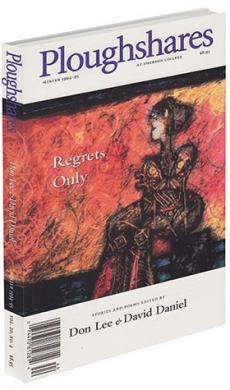rev. of The Blue Hour by Elizabeth Evans
The Blue Hour
A novel by Elizabeth Evans. Algonquin Books, $17.95 cloth. Reviewed by Janet Desaulniers.
In Elizabeth Evans’s first novel,
The Blue Hour, the narrator, Penny, recounts her teenaged years with both a child’s twitchy, anticipatory dread of the future and an adult’s sorrowful knowledge of the past. The book peels away the decorous lies of 1959 America, revealing people desperately caught up in the urge for upward mobility. Men throw everything they have into what they believe to be solid American concerns — meat, asphalt, doors — staking the financial and emotional lives of their families on bronze-colored Jaguars, sticks of furniture, skylights in the master bedroom. Penny’s family teeters just on the cusp of this urge. Her father, cursed with the gambler’s logic that only extreme risk brings extreme payoff, finds the percolating fears of his wife and two daughters such a terrible distraction that he insists on only happy words and pretty songs, as if the women were parakeets.
Penny, all eyes and ears, charts the strain. She hears the catch in her father’s voice as he proclaims faith in his shady business partner, and she notices each step of her older sister’s movement away from the family and into the relief of her own secrets with boys and drugs. Most wrenching, though, is Penny’s witness of her mother, Dotty, a woman who gave up the dream of a career in medicine to find herself cleaning out the drain at the bottom of the refrigerator. Increasingly exhausted by the strict limits of her life and by the required devotion to her hapless husband, Dotty becomes a picture of barely swallowed hysteria.
Ten-year-old Penny doesn’t make that mistake. She knows that love exists in this family, and she knows, too, that either the free or squandered expression of that love will be her legacy. “That’s not nice! Be nice to Mom, Dad!” Penny shouts in the middle of one of her parents’ quarrels. When her father, startled, says, “I think I know how to be nice to your mother,” Penny cries out, “Just kiss her!” The triumph of this book is that adult consciousness returns sorrowfully, gently, to the past, where it translates for us Penny’s terrible need, the need of every child: If only we would be happy, then they could be happy, too.
Janet Desaulniers’s short stories have appeared in Ploughshares, The New Yorker,
and other magazines. Her first collection is forthcoming from Knopf.


